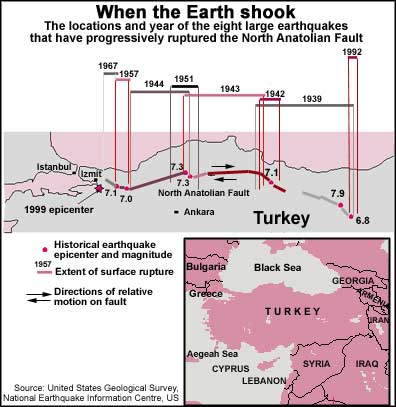The burning inferno
 The hazards posed by the blazing oil refinery caused by Tuesday morning's earthquake in Izmit, Turkey, though reported to be under control, may have far-reaching and serious consequences.
The hazards posed by the blazing oil refinery caused by Tuesday morning's earthquake in Izmit, Turkey, though reported to be under control, may have far-reaching and serious consequences.
Six of the 30 storage tanks containing 700,000 tonnes of crude oil went up in a blaze. Some 12 hours later, the entire town was covered in a blanket of foul smoke and soot. The toxic fumes from the blaze, if not effectively dispersed, will destroy all forms of aquatic life in nearby water bodies. It is feared that oil molecules present in the atmosphere will settle in a thin film on every water surface inhibiting the process of oxygen replenishment.
Talking to Down To Earth, C K Varshney, National Academic Director, Centre for Research on Environment, Ecology and Development, JNU, said: "There will definitely be an environmental impact of this refinery fire since the atmosphere is infused with an undesirable quantity of carbon dioxide. Another aspect is that all this CO2 is not completely burnt." This carbon-saturated soot in turn contains benzene-associated compounds which are carcinogenic and if inhaled in large quantities can result in fatal diseases like cancer.
Varshney further said: "There will be a lot of other intermediary compounds and Volatile Organic Compounds (VOC) which are present in the emissions. These can be dangerous." He added: "We do not yet know which part of the refinery or what is burning to have a more specific idea of what is coming out and in what quantity. However, the fact remains that it definitely has a detrimental effect on air quality."
Fears of an explosion forced the evacuation of the plant which is operated by the state-owned petroleum company Tupras. The government has declared the area a disaster zone, assuming over-riding powers to bring help to the region. Although the extent of damage to the environment and life is yet to be estimated, one thing is clear: recovery will be frustratingly slow.
